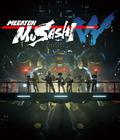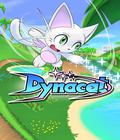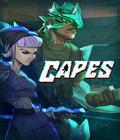When God of War: Ascension's multiplayer was announced, I was both surprised and hesitant. It was natural that Sony would want another God of War game within the PS3 life cycle, but I never entertained the thought of an online multiplayer mode for it. Ascension delivers a surprisingly fleshed-out online competitive component that I'd be interested in seeing in future God of War titles.
This entry predates every other God of War game, taking place slightly after Kratos murders his own family after being deceived by Ares, causing him to break his bond that gave him superhuman abilities. This puts him at odds with the Furies, a trio of frightful sisters tasked with punishing oath-breakers, and these three women make up the core antagonists in Ascension.
While other entries in the series have relied on well-known mythological characters like Zeus and Hercules for the boss roster, Ascension delves a little deeper into the mythology. I enjoyed this aspect of the story and appreciated seeing less-familiar characters. This can make it a little tough to keep track of who's doing what, considering the confusing names of some Greek mythological figures, but you'll get the basics quickly enough.
The previous prequels on the PSP explored the history of Kratos in a fashion that was more interesting than the plot in Ascension. While I appreciate the diversity offered by the cast and setting, the overall story did little to add any significant insight into Kratos as a character or give additional weight to his actions in later games.
The single-player portion is still a big part of the experience for God of War fans, and thankfully, the developers haven't forgotten that. I'm not completely sold on the plot, but I had a lot of fun with the campaign, and I enjoyed the interesting additions and changes to the series' signature mechanics. Not much has changed, so a lot of mechanics are going to be instantly familiar to anyone who follows the franchise. There are some light platforming elements, Quick Time Events for various encounters and cut scenes, and a number of environmental puzzles. I'm not a big fan of QTEs, but they're more forgiving here.
The sense of scale in the locales is massive, and while the scope of this story is dialed back from his exploits on Mount Olympus in God of War III, there are quite a few jaw-dropping sequences. The visual acuity hasn't dropped off from the previous game, but I noticed some minor visual flaws, like character models clipping through the environment more than in previous entries.
The combat in Ascension is also largely unchanged, and it's just as fun to play. Kratos wields the familiar Blades of Chaos, and most of the move list for that weapon remains intact from the prior God of War titles. The biggest change is the introduction of magic fused with the blades. While Kratos can call on limited powerful magic attacks, the Blades of Chaos also take on the property of equipped magic. This can make your standard attacks quicker or more powerful, and once you max out the Rage Meter, you gain abilities that are unique to each magic property.
This addition is a neat concept and provides an additional use for magic, but it's never fleshed out enough to feel necessary. For the most part, you can stick with a single magical effect for the entirety of the campaign with little risk. The only time I felt compelled to change tactics and use different abilities was when I played through the maddening difficulty spike represented by the Trial of Archimedes late in the game.
Other additions to the series are less appreciated. In a series of sequences, you're stuck sliding downhill and need to maneuver Kratos around pits and damaging obstacles. These instant-death situations are tough pills to swallow when it comes to the QTEs, but tossing in another gameplay aspect that forces multiple restarts due to bad timing becomes even more taxing for anyone's patience.
A piece of equipment allows you to target an object and adjust its place in time, so you can either decay or rebuild structures for various puzzles. It's a decent idea and works as intended, but sometimes, the overall effect is miserably slow. It will grind your forward momentum to a halt, and aside from the few times when you need to manipulate the rebuild progress instead of doing a full rebuild or teardown, it's not nearly as intriguing a concept as it initially sounds.
The campaign still has a lot of great moments. The entirety of the Statue of Apollo sequence is fantastic and delivers all the epic world-building we've come to love from the series. There's an incredible sequence involving extremely large mechanical snakes that manipulate the locks on a tower that's almost breathtaking in scale. At various points during the sequence, a miniscule speck represents Kratos. Some of these moments can get frustrating when combat is introduced, but aside from an early sequence involving a giant, I had little issue with this effect.
Another positive addition to the gameplay comes from the World Weapon system. Essentially, you can pick up an occasional subweapon by disarming enemies or running across something embedded in the ground. Examples range from simple swords and shields to more interesting items, like an explosive sling. These weapons are limited in use, can be chained into combos with the Blades of Chaos, or perform more devastating single-use attacks to stun or impair opponents. It adds more variety to combat than simply wielding the Blades of Chaos throughout the adventure, and it often ends up being useful.
The multiplayer portion is where Ascension really stands out, and it justifies its existence in a way that the single-player story does not. It's drawn from a sequence in the single-player segment, so it's worth your time to play through the first hour of the campaign to see the tie-in, which elicited a chuckle from me. That's where the story angle ends and introduces you to a series of competitive modes and maps designed around getting the most kill, completing objectives, and accumulating points to win the round.
The various modes tend to ditch the concepts of standard stuff, like Team Deathmatch and free-for-all Deathmatch, although there is a bit of that, too. There are other familiar elements in play, like a Capture the Flag mode, but where the multiplayer really shines is in the map design and the multiple ways to win a match. Even the standard four-vs.-four modes or two-vs.-two modes give you optional objectives to clear to earn Favor, which is the name of the point system in Ascension.
Each mode has a certain Favor goal in order to win, which can be accumulated by completing those objectives, killing opponents, or gathering Favor from chests that materialize at random intervals. The maps are designed to be multileveled on a vertical scale, giving you a lot of traversal options and pathways. There are even control points at various spots in most maps, with a couple of modes being focused solely on capturing and holding these points.
Beyond the variety of modes available, there's also a hefty amount of customization for your character. At the onset of the multiplayer mode, you need to align with one of four gods: Ares, Hades, Poseidon or Zeus. These selections are essentially classes, which can be a daunting task to choose before you're familiar with the game, but the abilities are well explained, and you have the opportunity to test each role in practice battles before committing.
When you win matches and gain experience, you'll also level up your character to unlock new abilities, equipment, items and magic. Equipment feels special, with each piece having an experience bar, so you can improve your current gear as you play and win more battles. There are also sets of gear that are specific to your aligned deity, giving you something unique to shoot for in order to maximize your class and its role in the game.
From a technical standpoint, the multiplayer is also pretty polished. I didn't have any issues finding matches, and even though the game has been out for a couple of weeks, the interest still seems strong. It's quick to get a match going, and while I'd rather see some more robust search options than picking a mode and waiting to join, I didn't experience any significant lag across various connections and was never dropped from a match.
It's hard for me to make a case as to why you should play through God of War: Ascension's campaign, which is still a fine experience but is hardly the strongest in the franchise. The multiplayer component is what keeps Ascension from being a forgotten prequel. It's something that I expect to see fleshed out even more for the inevitable next-gen God of War sequel, and it's the reason to pick up this particular entry.
I can't overstate quickly I became engrossed by the multiplayer. It's similar to the shock of Assassins Creed: Brotherhood when it introduced multiplayer to a franchise that didn't need it. Similar to that introduction, while I didn't ask for multiplayer in God of War, I'm certainly glad that the developers took the initiative.
Score: 7.5/10
More articles about God of War: Ascension











 God of War: Ascension is an action-adventure game that offers an epic single-player story mode, as well as a deep, innovative multiplayer experience.
God of War: Ascension is an action-adventure game that offers an epic single-player story mode, as well as a deep, innovative multiplayer experience. 


































